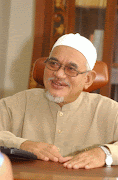Yusuf al-Qaradawi (Arabic: يوسف القرضاوي Yūsuf al-Qaraḍāwiy; born September 9, 1926) is a controversial,Egyptian Islamic theologian. He is best known for his programme, ash-Shariah wal-Hayat ("Shariah and Life"), broadcast on Al Jazeera, which has an estimated audience of 60 million worldwide. He is also well known for IslamOnline, a popular website he helped found in 1997 and for which he now serves as chief religious scholar.
Al-Qaradawi has published more than 120 books, including The Lawful and the Prohibited in Islam and Islam: The Future Civilization. He has also received eight international prizes for his contributions to Islamic scholarship,and is considered one of the most influential such scholars living today. Al-Qaradawi has long had a prominent role within the intellectual leadership of the Muslim Brotherhood, an Egyptian political organization, but twice (in 1976 and 2004) turned down offers for the official role in the organization.
Some of al-Qaradawi's views have been controversial in the West: he was refused an entry visa to the United Kingdom in 2008, and barred from entering France in 2012.
As of 2004, al-Qaradawi was a trustee of the Oxford Centre for Islamic Studies. He also served as a technical consultant for an epic movie in English on Muhammad.
Al-Qaradawi was born in Safat Turab village in the Nile Delta, Egypt, in a poor family of devout Muslim peasants. He became an orphan at the age of two, when he lost his father. Following his father's death, he was raised by his uncle. He read and memorized the entire Qur'an by the time he was nine years old.
He then joined the Institute of Religious Studies at Tanta, and graduated after nine years of study. He moved on to study Islamic Theology at the Al-Azhar Universityin Cairo, from which he graduated in 1953. He earned a diploma in Arabic Language and Literature in 1958 at the Advanced Arabic Studies Institute. He enrolled in the graduate program in the Department of Qur'an and Sunnah Sciences of the Faculty of Religion's Fundamentals (Usul al-Din), and graduated with a Masters degree in Quranic Studies in 1960. In 1962, he was sent by Al-Azhar University to Qatar to head the Qatari Secondary Institute of Religious Studies. He completed his PhD thesis titled Zakah and its effect on solving social problems in 1973 with First Merit, and was awarded his PhD degree from Al Azhar.
In 1977, he laid the foundation for the Faculty of Shari'ah and Islamic Studies in the University of Qatar and became the faculty's dean. In the same year he founded the Centre of Seerah and Sunna Research.
He also served at the Institute of Imams, Egypt under the Egyptian Ministry of Religious Endowments as supervisor before moving back to Doha as Dean of the Islamic Department at the Faculties of Shariah and Education in Qatar, where he continued until 1990.His next appointment was in Algeria as Chairman of the Scientific Council of Islamic University and Higher Institutions in 1990–91. He returned to Qatar once more as Director of the Seerah and Sunnah Center at Qatar University, a post he still occupies today. Al-Qaradawi is the head of the European Council for Fatwa and Research,an Islamic scholarly entity based in Ireland. He also serves as the chairman of International Union for Muslim Scholars (IUMS).
He was imprisoned under King Farouq in 1949, then three times during the reign of former President Gamal Abdul Nasser, until he left Egypt for Qatar in 1961. He returned to Egypt in 2011 in the wake of the 2011 Egyptian Revolution.
Al-Qaradawi is a principal shareholder and former Sharia adviser to Bank Al-Taqwa, a member bank of the Lugano-Switzerland Al-Taqwa group, a bank that the U.S. states finances terrorism and that the UN Security Council had listed as associated with Al Qaeda.On August 2, 2010, the bank was removed from a list of entities and individuals associated with Al Qaeda maintained by the Security Council.
Al-Qaradawi has three sons and four daughters,three of whom hold doctorates from British Universities.His daughter, Ilham Yousef Al-Qaradawi, is an internationally recognized nuclear scientist.While his son, Abdurrahman Yusuf al-Qaradawi, is a poet and a political activist in Egypt.
In 2008, in an online poll, Yusuf al-Qaradawi was voted the 3rd most intellectual person in the world on the list of Top 100 Public Intellectuals by Prospect Magazine (UK) and Foreign Policy (United States).
2011 return to Egypt
After the 2011 Egyptian Revolution Qaradawi made his first public appearance in Egypt after 1981.In Tahrir Square he led Friday prayers on February 18, addressing an audience estimated to exceed two million Egyptians. It began with an address of “Oh Muslims and Copts,” referring to Egypt’s Coptic Christian minority instead of the customary opening for Islamic Friday sermons “Oh Muslims”.He was reported to have said,“Egyptian people are like the genie who came out of the lamp and who have been in prison for 30 years.” He also demanded the release of political prisoners in Egyptian prisons, praised the Copts for protecting Muslims in their Friday prayer, and called for the new military rulers to quickly restore civilian rule.




 Kelasi Kapal
Kelasi Kapal


 Posted in:
Posted in:
0 comments:
Post a Comment